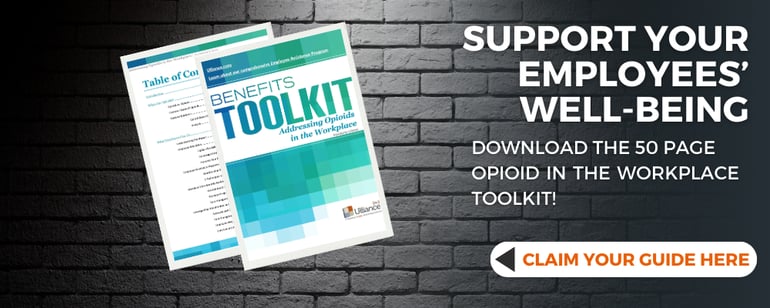Substance abuse is the term used to describe the harmful or hazardous use of psychoactive substances, including alcohol, drugs, and prescription and over-the-counter medications. The abuse of these substances can have a major impact on individuals, families, and communities.
In the workplace, substance abuse poses a significant threat to both employee well-being and workplace stability. Substance abuse in the workplace can impact not only the individual employees but also the overall organization. According to a study by the National Council on Alcoholism and Drug Dependence (NCADD), substance abuse is a contributing factor in nearly 65% of all accidents on the job, and employees who struggle with a Substance Use Disorder (SUD) are 2.5 times more likely to take unexcused absences from work.
This behavior not only jeopardizes the safety and health of the individual and their co-workers but can also result in decreased productivity, increased insurance costs, and higher medical expenses.
The Prevalence of Substance Abuse in the Workplace
A 2022 report by the Substance Abuse and Mental Health Services Administration (SAMHSA) highlights that 48.7 million people aged 12 or older (or 17.3%) in the United States struggled with a substance use disorder (SUD) in the past year. The impact of these substances extends far beyond the individual.
While the national statistics paint a concerning picture, a closer look at the specific substances commonly abused in the workplace adds depth to the issue.
- Alcohol abuse is prevalent, with its potential for impairment significantly impacting safety, judgment, and coordination.
- Prescription drugs, sometimes misused or taken without a doctor's supervision, also pose a threat.
- Opioids, which are often prescribed for pain management, can lead to dependence and drowsiness, while stimulants like Adderall intended for ADHD treatment can be misused to increase focus and energy, potentially leading to addiction and negative health consequences.
- Illegal narcotics like cocaine and methamphetamine are highly addictive and can pose severe health risks.
- Marijuana usage, both medicinal and recreational, is also becoming more common in the workplace.
The factors contributing to substance abuse in the workplace are multifaceted. Mental health issues like anxiety and depression can play a role, as individuals may turn to substances as a coping mechanism. Easy access to substances like alcohol and over-the-counter medications can exacerbate the issue.
Understanding these contributing factors allows employers to develop a more holistic approach to addressing substance abuse in the workplace.

The Impact of Substance Abuse on Employees
Substance abuse can have many detrimental impacts on employees in the workplace.
- Increased Accidents and Injuries - According to the National Safety Council, workers who abuse drugs are 3.5 times more likely to be involved in a workplace accident. Impaired judgment and coordination under the influence of substances significantly elevate the risk of accidents and injuries on the job. This can be particularly dangerous in workplaces with heavy machinery, hazardous materials, or physically demanding tasks.
- Long-Term Health Issues - Substance abuse can lead to a variety of long-term health problems, including liver damage, heart disease, respiratory issues, and mental health disorders. These health problems can impact not only the employee's overall well-being but also might lead to increased healthcare costs for both the individual and potentially the company.
- Absenteeism and Tardiness - Substance abuse can lead to frequent absences and tardiness due to hangovers, withdrawal symptoms, or seeking treatment. This disrupts workflow and creates an additional burden on colleagues who may have to take on extra work.
- Decreased Focus and Concentration - The ability to focus and concentrate is essential for many jobs. Substance abuse can impair cognitive function, leading to errors in judgment, missed deadlines, and lower quality of work.
- Poor Decision-Making - Substance use can cloud judgment and decision-making abilities, potentially leading to risky behavior or unsafe practices in the workplace.
- Strained Relationships - Substance abuse can negatively impact relationships with coworkers and supervisors. Unreliable behavior, personality changes, and impaired communication can create a tense work environment.
- Financial Problems - Substance abuse can lead to financial problems due to lost productivity, missed work, and potential legal issues. This can further exacerbate stress and mental health concerns.
- Mental Health Challenges - Addiction is often a symptom of underlying mental health issues like anxiety or depression. Substance abuse can exacerbate these conditions, creating a negative cycle that worsens mental health.
4 Significant Impacts of Substance Abuse on Companies
The consequences of substance abuse in the workplace ripple outward, affecting not only the individual struggling with addiction but also their colleagues and the overall business.
1. financial costs
Substance abuse among employees can lead to a number of negative financial consequences for companies.
- Employees struggling with substance abuse are more likely to require healthcare resources, potentially leading to higher insurance costs for companies.
- Frequent absences due to substance abuse can disrupt workflow, leading to additional costs associated with temporary replacements or overtime pay for existing staff.
- The increased accident rates associated with substance abuse can result in property damage, equipment repair costs, and potential workers' compensation claims.
2. decreased morale and retention
Substance abuse can result in a toxic work environment, leading to decreased morale and job satisfaction that reverberates well beyond the employee with the substance abuse issue. This can then contribute to increased turnover rates as employees may look for a safer and healthier work environment, which in turn can result in additional costs associated with hiring and training new staff.
Substance abuse can also lead to poor work performance, absenteeism, and tardiness, which can affect the overall productivity of the organization. Additionally, it can increase the risk of accidents, injuries, or even fatalities in the workplace, endangering the safety of all employees and potentially leading to legal and financial penalties for the organization.
3. legal liabilities
Employers have a legal obligation to provide a safe workplace, as outlined by the Occupational Safety and Health Act (OSHA) and potentially additional state regulations. This obligation extends to protecting employees from hazards caused by substance abuse.
When employees are under the influence, they pose a risk to themselves and others. Here are potential legal consequences of failing to address substance abuse:
- If an accident or injury occurs on the job due to an employee's substance abuse, the employer could be sued for negligence. This could happen if the employer:
- Failed to implement a clear substance abuse policy.
- Knew or should have known about an employee's substance abuse problem and failed to take reasonable steps to address it.
- Did not provide adequate training to supervisors on identifying and reporting substance abuse. - If an employee is injured due to their own substance abuse, it may still be considered a workers' compensation claim. However, employers may face increased premiums or even have coverage denied for future claims if they are deemed negligent in addressing substance abuse within the workplace.
- OSHA has the authority to fine companies for safety violations. If substance abuse is found to be a contributing factor in accidents or injuries, employers could face significant fines.
These legal consequences can be financially devastating for a company.
4. employer reputation
When reports of substance abuse issues surface within a company, it can have a significant negative impact on the business. Such news can quickly spread and damage the company's reputation, leading to a loss of trust among employees, customers, and stakeholders. It can also make it challenging for the company to attract and retain top talent, especially if the company is known for its toxic work culture.
Creating a Safe and Supportive Workplace
The good news is that employers can play a crucial role in combating substance abuse in the workplace by fostering a safe and supportive environment. Here are some key strategies:
develop a clear substance abuse policy
- A well-defined policy outlines prohibited substances, expected employee conduct, and the consequences for violations. It should be clear, concise, and easily accessible to all employees.
- The policy should establish a transparent process for reporting suspected abuse. This can be done through anonymous reporting channels or designated supervisors with appropriate training.
- Specifying consequences for violations of the policy helps manage expectations and encourages responsible behavior. However, the focus should be on rehabilitation and support, not solely on punitive measures.
offer an employee assistance program (eap)
- An Employee Assistance Program (EAP) provides confidential support and resources for employees struggling with substance abuse or other personal challenges. This can include counseling, referrals to treatment programs, and educational resources.
- Raising awareness of EAPs is crucial. Regular communication and promoting resources through internal channels can encourage help-seeking behavior and reduce the stigma associated with addiction.
promote a culture of safety and well-being
- Encouraging open communication about substance abuse concerns is essential. This creates a climate where employees feel comfortable seeking help without fear of judgment or retaliation.
- Supervisors should receive training to identify the warning signs of substance abuse in employees. This can help them address early concerns and encourage individuals to seek support before the issue escalates.
- Offering stress management and wellness programs can be highly beneficial. These programs can equip employees with healthy coping mechanisms and promote overall well-being, potentially reducing the risk of turning to substances for emotional relief.
By implementing these strategies, employers can create a work environment that discourages substance abuse, encourages support for those struggling, and prioritizes the overall health and well-being of their workforce. This not only benefits employees but also fosters a safer, more productive, and resilient business.
Final Thoughts
Substance abuse can have serious consequences for both individuals and organizations. Employers must recognize their role in creating a safe and supportive work environment by implementing clear policies, promoting awareness of resources, and fostering a culture of safety and well-being.
When you partner with Ulliance, our Life Advisor Consultants are always just a phone call away to teach ways to enhance your work/life balance and increase your happiness. The Ulliance Life Advisor Employee Assistance Program can help employees and employers come closer to a state of total well-being.
Investing in the right EAP or Wellness Program to support your employees will help them and help you. Visit https://ulliance.com/ or call 866-648-8326.
The Ulliance Employee Assistance Program can address the
following issues:
• Stress about work or job performance
• Crisis in the workplace
• Conflict resolution at work or in one’s personal life
• Marital or relationship problems
• Child or elder care concerns
• Financial worries
• Mental health problems
• Alcohol/substance abuse
• Grief
• Interpersonal conflicts
• AND MORE!
Have some questions about our services? Book a quick meeting below!
References:
Addiction in the Workplace; Gateway Foundation,https://www.gatewayfoundation.org/addiction-blog/addiction-in-the-workplace/
Addiction in the Workplace; Addiction Center
https://www.addictioncenter.com/addiction/workplace/
Alcohol Addiction at Work: What Employers Should Know; Society for Human Resources Management; Matt Gonzalez
https://www.shrm.org/topics-tools/news/inclusion-equity-diversity/alcohol-addiction-work-employers-know
Drugs and Alcohol in the Workplace: National Council on Alcoholism and Drug Dependence, https://ncadd.us/about-addiction/addiction-update/drugs-and-alcohol-in-the-workplace
The Effects of Substance Abuse in the Workplace; American Addiction Centers, https://americanaddictioncenters.org/workforce-addiction

